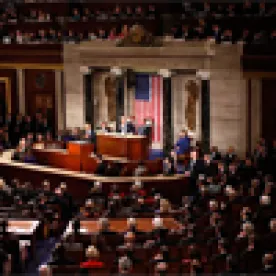Litigation by the Senate Permanent Subcommittee on Investigations to enforce a subpoena for documents from Carl Ferrer, the CEO of Backpage, an online forum accused of contributing to sex trafficking, has taken another interesting twist, with the D.C. District Court ruling that Backpage cannot assert the attorney-client privilege to protect certain documents. It is rare for a court to issue a ruling on attorney-client privilege in a congressional investigation, and the court’s ruling has significant implications for any individual or company facing demands from Congress for documents, information, or testimony.
For about a year, Ferrer has been fighting the Subcommittee’s subpoena primarily on First Amendment grounds, but the Supreme Court recently ruled that he must comply with the subpoena, even as the substantive First Amendment appeal is ongoing.
After Ferrer lost at the Supreme Court, he sought permission from the District Court to extend the deadline for compliance with the subpoena. In a motion for an extension of time filed on September 13, 2016—the day of the deadline—Ferrer said that Backpage had been working since August to “prepare for production all responsive, non-privileged documents,” but it could not produce “every last responsive document and complete privilege logs by September 13, 2016.”
The Senate Subcommittee took sharp issue with the references to privileged materials, stating flatly that the claims were “outrageous.” “Ferrer never hinted that he intended to assert new privileges if he lost” in the First Amendment litigation, the Senate said. Ferrer countered, in a further filing, that Backpage had informed the Subcommittee that privileged documents were being withheld as early as November 2015.
Congress has consistently maintained that it does not recognize common law, court-created privileges, including the attorney-client privilege. Congress’s position is rooted in the Constitution’s separation of powers and the inherent legislative authority to conduct investigations. Privilege disputes are rare, but when they have occurred, Congress has usually prevailed.
The District Court’s ruling did not directly address Congress’s position on the attorney-client privilege. Instead, it held that Ferrer had waived the privilege by failing to claim the privilege and file a privilege log. The ruling has significant implications for congressional investigations.
Over decades of practice and countless investigations, congressional investigators and Washington lawyers have developed an equilibrium on privilege issues that has generally worked well: Congress maintains that it does not recognize the attorney-client privilege and those under investigation provide documents or privilege logs in a manner that generally avoids privilege fights. In this equilibrium, both sides have an interest in avoiding early line-drawing on issues of privilege. Ferrer’s case, however, makes clear that a subpoena recipient risks waiving privileges that are not explicitly claimed early in the process, even if negotiations are ongoing.
Relatedly, the court’s order does not clearly identify the moment that a subpoena recipient must claim the privilege or risk a waiver. In the order, the court first suggested that Ferrer waived the privilege by failing to file a privilege log before the original subpoena deadline, which was an explicit requirement of the subpoena. “This was not a suggestion or a recommendation,” the court said. “Failure to do so constituted a waiver of the claimed privileges.” Elsewhere, however, the court suggested that the privilege could have been claimed later, noting that Ferrer had “numerous opportunities to assert” the privilege and produce a log “before the Court entered its order compelling production.”
In practice, the deadlines on congressional subpoenas and other requests are extremely short (Ferrer’s was issued on October 1 with a return date of October 23). Congressional investigators generally prefer short deadlines because of a desire to move quickly and because a missed deadline can significantly increase the public and media pressure on the recipient. Subpoena recipients typically produce some documents by the original return date and commit to future “rolling” productions. In this common situation, it is not possible to produce a full privilege log until the productions are complete. This process works well and avoids privilege fights because Congress has access to significant materials, which often address congressional concerns, before the parties turn to considering documents that have been withheld. The Ferrer case, if it is read to upset this practice, serves neither the interests of congressional investigators nor lawyers representing those under investigation.
Finally, Ferrer’s situation was exacerbated by the lack of a mechanism to challenge a congressional subpoena except by refusing to comply and litigating the congressional contempt or enforcement resolution. As Ferrer noted, the traditional methods of challenging a subpoena, such as a motion to quash, are unavailable for congressional subpoenas. Ferrer thus “followed the only available procedure through which his constitutional objections could be raised in a court of law.” Because this process necessarily required that he defy the subpoena, the court’s ruling underscores the importance of taking steps to preserve each and every claim of privilege throughout the process, even in the midst of subpoena defiance.
We wonder whether Ferrer’s case may finally lead to a direct court ruling on Congress’s position on attorney-client privilege. That seems unlikely, especially given the District Court’s reliance on waiver arguments instead. Then again, a Supreme Court ruling on a constitutional challenge to a congressional subpoena also seemed unlikely not too long ago.




 />i
/>i


